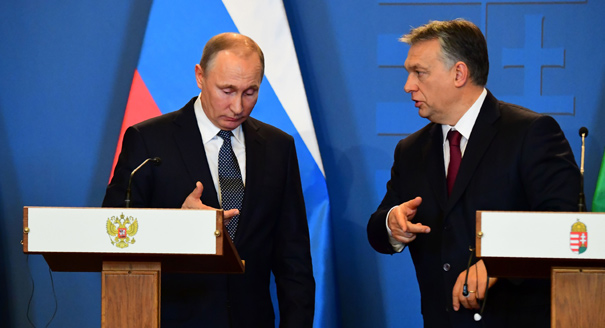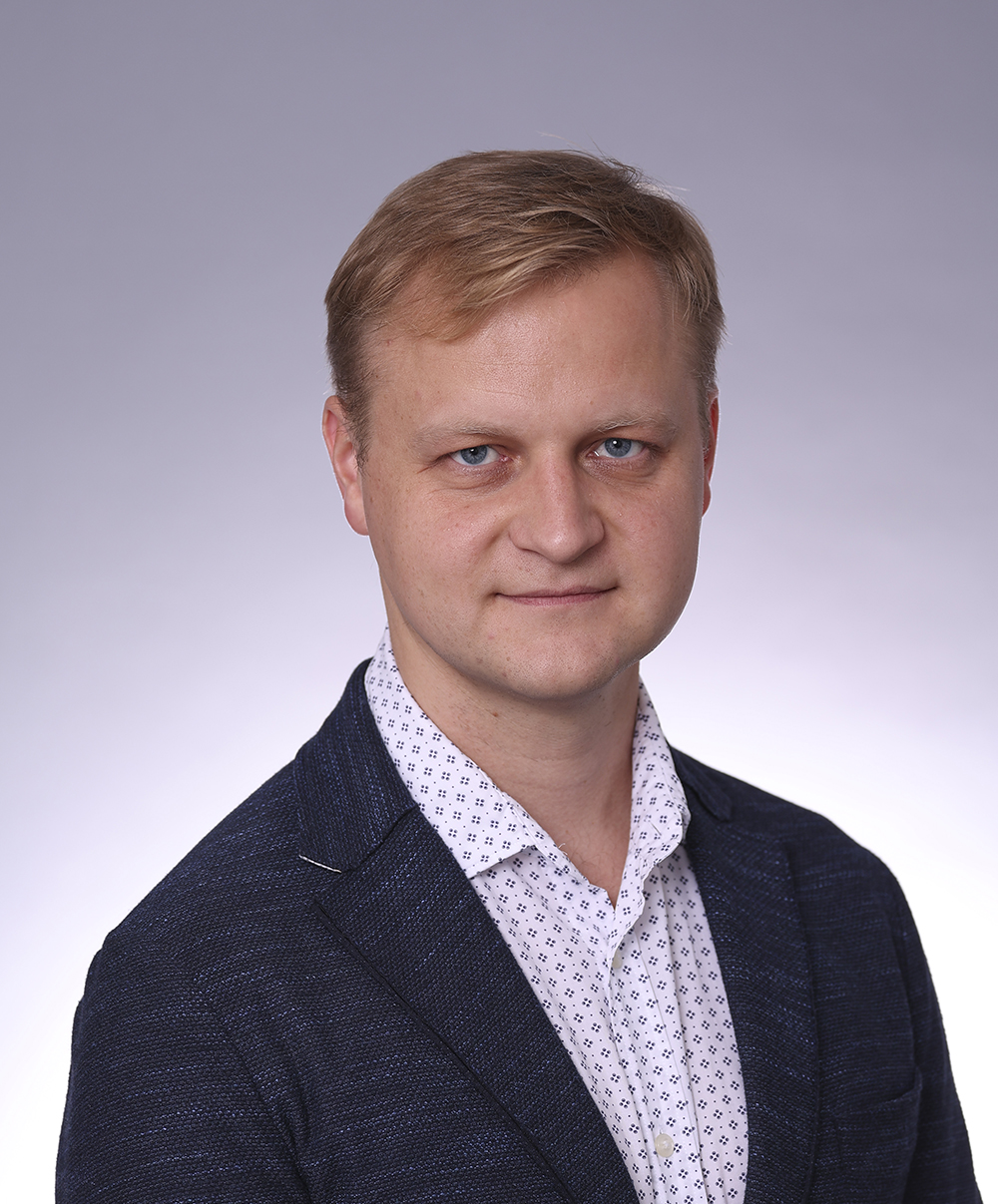Maksim Samorukov
{
"authors": [
"Maksim Samorukov"
],
"type": "commentary",
"centerAffiliationAll": "",
"centers": [
"Carnegie Endowment for International Peace",
"Carnegie Russia Eurasia Center"
],
"collections": [],
"englishNewsletterAll": "",
"nonEnglishNewsletterAll": "",
"primaryCenter": "Carnegie Endowment for International Peace",
"programAffiliation": "",
"programs": [],
"projects": [],
"regions": [],
"topics": []
}
Source: Getty
Russia and Hungary’s Fruitless Friendship
The Hungarian prime minister’s trip to Moscow was short on substance—despite loud declarations to the contrary. Even a risk-taker like Viktor Orban cannot afford to abandon the West to make separate deals with Russia.
Hungarian Prime Minister Viktor Orban is the obvious candidate to be Russia’s best friend in the European Union. A man with an authoritarian streak who is in frequent conflict with Brussels, he publicly told President Vladimir Putin on February 17 that the EU’s sanctions against Russia might not be extended this summer.
The two leaders have formed a habit of visiting each other once a year, somewhere around the end of winter. Every time—and again in Moscow this week—they announce to the world that their friendship is as strong as ever and that they intend to expand their cooperation even further.
Yet, every year, these declarations look more and more ritualistic. The relationship between Russia and Hungary is in fact built on much less than is presented. Even two leaders who are as ready to defy world opinion as Orban and Putin cannot overcome certain global realities.
One example of this reality check is what was supposed to be the new cornerstone in the Hungarian-Russian relationship—the promise of Russian support for two new reactors in Hungary’s Paks nuclear power plant.
In a deal signed two years ago, Russia pledged to extend a 10-billion-euro line of credit to Hungary for the reactors in addition to a Hungarian promise of 2.5 billion extra euros from the state budget.
If the project is completed, Russia will be firmly entrenched in the Eastern European nuclear power market for decades to come, while Hungary will receive inexpensive electric energy that will meet about one third of its demand.
Yet, despite many declarations, no work has actually begun on the project and no money has been transferred for it.
The problem is that both sides are waiting for a green light from the European Union, which is in no rush to give its blessing to a project it dislikes. Brussels is carrying out three simultaneous investigations into the legality of the deal.
The first investigation is into the terms of the tender. The Hungarians negotiated the deal only with Russia in a nontransparent process. The second line of criticism is that by allocating public funds for the new reactors, Hungary may be subsidizing one of its own energy suppliers to the exclusion of other suppliers to the market from other EU countries. That would be a breach of competition practices.
There are also environmental concerns. The EU dislikes nuclear power plants in general and especially Russian ones. It has ordered the closure of several of them in Lithuania, Bulgaria, and Slovakia in recent years and has not given permission for construction of any new ones. Having expended so much effort on closing these plants, Brussels is far from keen to let the Hungarians start a new construction project at Paks.
It would be controversial if the EU were to halt a bilateral agreement between two countries on building the two new reactors. But, by simply dragging its feet, Brussels may ensure that the project collapses by itself. The Russians may run out of money—Deputy Finance Minister Sergei Storchak has already stated that Russia may cut back drastically on its loans to foreign countries. Moreover, Hungary’s opposition parties have promised to cancel the deal if they win the next elections, due in 2018.
A second centerpiece of Hungarian-Russian relations is gas. In recent years, Hungary has broken ranks with its EU partners in supporting Russian gas pipeline projects, such as South Stream and Turkish Stream. Both those projects have now been scrapped—but that did not stop both sides from using the meeting in Moscow to announce grandly that they had agreed to extend their long-term gas contract until 2019.
This looks like an impressive announcement, especially as Hungary imports more than 80 percent of the gas that it consumes from Russia. But in fact this was not an issue that required the personal intervention of top leaders.
The Hungarians had obtained substantial discounts on gas a long time ago. The global fall in energy prices ensured that the two sides would conclude a deal on this issue. Moreover, other European countries receive gas from Russia in similar or even greater quantities, but their leaders do not choose, as Orban did, to go to the Kremlin to trumpet a breakthrough in gas negotiations.
Two ambitious leaders such as Orban and Putin are incapable of just meeting, having a quiet talk, and going their separate ways. They need to make big announcements. So for the lack of better options, they had to move around the dates in their long-term gas contract and present it as a major step forward in their bilateral relations.
The two sides were worried that the news of a gas deal would end up being the one and only achievement of the Moscow meeting. Which is evidently why the Russian media announced something else that would satisfy high expectations: that Hungary was about to buy 30 Russian military helicopters at a cost of half a billion dollars.
If confirmed, this would not be unprecedented. Many Central and Eastern European countries have continued to buy Russian arms even after they joined NATO. But the reported scale of the deal, comprising almost half of Hungary’s annual military budget, was incredible.
Hungary has actually been criticized recently by NATO for spending too little on defense—for expenditures equal to only 1 percent of its GDP. So it was impossible to believe that the country would suddenly use up half of its defense budget on Russian helicopters. And so it proved—no one even mentioned the alleged helicopter deal during Orban’s visit to Moscow.
The issue is not that Orban would be averse to buying Russian helicopters, especially if they came on favorable commercial terms. The deeper problem with Hungarian-Russian relations—whether the question is over helicopters, gas, or nuclear power plants—is that Hungary is too deeply integrated into Western structures for even a leader as headstrong as Viktor Orban to change things. On the domestic front, he is free to rewrite the country’s constitution a few more times. Abroad, his hands are much more tied.
The ultimately empty agenda in Orban’s visit to Moscow demonstrates that Russia is on a fool’s errand if it hopes it can split the West by identifying “right” friendly leaders of Western countries and ignoring the rest. That tactic has not even worked with Orban, who appears theoretically ready to take the risk. Even though he rails constantly against the EU, Orban is not capable of picking a serious fight with the EU or NATO that could undermine his position both at home and abroad.
And if Orban is not ready to take that kind of risk, other Western leaders are even less inclined to do so. If Russia is unable to normalize relations with the West as a whole, all its attempts to forge separate alliances and special personal relationships with individual Western countries will prove as fruitless as they have turned out to be with Hungary
About the Author

Fellow, Carnegie Russia Eurasia Center
Samorukov is a fellow at the Carnegie Russia Eurasia Center.
- Ever Increasing Circles: How Bulgaria Is Straying from Russia’s OrbitOther
- In Odesa’s Shadows: What Is Russia’s Strategy in Moldova?Paper
Maksim Samorukov
Recent Work
Carnegie does not take institutional positions on public policy issues; the views represented herein are those of the author(s) and do not necessarily reflect the views of Carnegie, its staff, or its trustees.